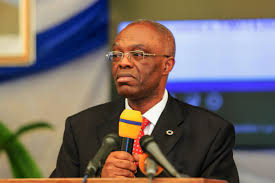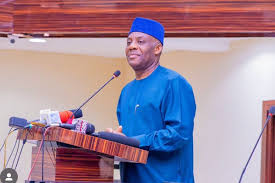
WHO urges Nigeria to embrace AI in disease surveillance
- Health Security
- No Comment
- 287

According to Mr Mulombo, Nigeria can enhance its ability to detect, prevent, and respond to public health emergencies by adopting AI in its disease surveillance.
The World Health Organisation (WHO) has urged the Nigerian authorities to leverage artificial intelligence (AI) in disease surveillance.
Speaking at the opening of the 5th annual disease surveillance review meeting (ADSRM) organised by the Nigeria Centre for Disease Control and Prevention (NCDC), WHO Country Representative for Nigeria, Walter Mulombo, stressed the need for AI integration in pandemic preparedness and response.
According to Mr Mulombo, Nigeria can enhance its ability to detect, prevent, and respond to public health emergencies by adopting AI in its disease surveillance.
He explained that the aim of AI integration is to contribute to the reduction of morbidity mortality, disability and socioeconomic disruptions due to disease outbreaks and other health emergencies in the WHO African Region.
Mr Mulombo added that “AI has the potential to revolutionise global health security by enabling more proactive, data-driven approaches to health threats.”
However, he said some of the challenges and ethical considerations include data privacy and security, ethical AI development and deployment.
One Health approach
Mr Mulombo further advocated for a collaborative surveillance approach, integrating human, animal, and environmental interfaces under the One Health framework.
The One Health approach is a collaborative strategy that recognises the interconnectedness of human, animal, and environmental health. It aims to address the complex relationships between these sectors to prevent, detect, and respond to health threats.
The WHO Country Director emphasised the importance of a holistic approach to disease surveillance, going beyond just the health ministry.
By adopting this approach, he explained that Nigeria can rethink its surveillance interventions and better address the root causes of disease outbreaks.
This is particularly important, as many infectious diseases originate from animals and the environment. The One Health strategy has already been launched in Nigeria, with a national plan in place since 2019.
Funding challenge
Mr Mulombo also identified funding as a major challenge with disease surveillance, stressing the need for both domestic and international support to meet the 2030 targets.
According to him, funding is a significant obstacle for countries, including Nigeria, in achieving the 2030 global health targets, which was also highlighted at the recent UN General Assembly in September.
He noted that to address this, financial intermediary funds have been established to supplement domestic funding, particularly for low- and middle-income countries, enabling them to detect, prepare, and respond to health emergencies.
He observed that Nigeria’s challenges are not unique and that no country was prepared for the COVID-19 pandemic, adding that effective investment of available resources is crucial, prioritizing grassroots levels and local governments.
NCDC DG speaks
In his remarks at the meeting, the Director General of NCDC, Jide Idris noted that global health security is a daily commitment to protecting and preparing every community in Nigeria.
Mr Idris said true health security begins at the grassroots level- in towns, villages, and neighbourhoods.
“Every case prevented, every life saved at the local level, strengthens the health security of our entire nation and, indeed, of the world,” he said.
Disease surveillance meeting
The ADSRM event, themed: “Strengthening Global Health Security Through Enhanced Disease Surveillance,” is scheduled to hold from 28 to 30 October in Lagos.
According to the NCDC Director of Surveillance and Epidemiology, Fatima Saleh, ADSRM is an annual event where the NCDC hosts a network of state epidemiologists and other frontline workers.
Ms Saleh said ADSRM was conducted in the year 2016 and subsequently in 2017, 2018 and 2022. “It is a one-health strategy involving critical stakeholders from government ministries, departments, and agencies.”
According to Ms Saleh, the meeting aims to review and update stakeholders on surveillance activities in Nigeria in the previous years to improve on identified gaps and challenges.
She added that the expected outcome is for participants to have “a better understanding of challenges faced by each state regarding surveillance activities and operations as well as proposing solutions.”
By Mariam Ileyemi




